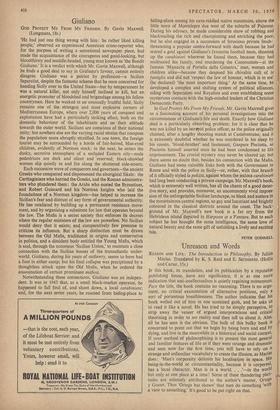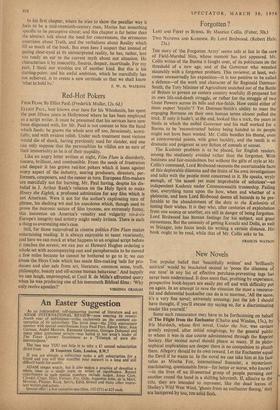Unreason and Words
IF this book, its translation, and its publication by a reputable publishing house, have any significance, it is as one more indication that anti-intellectualism is quietly regaining momentum. Pace the title, the book contains no reasoning. There is no argil- ment, no critical examination of alternative positions, only a sort of portentous breathlessness. The author indicates that his book welled out of him in one sustained gush, and he asks us to read it like a novel. He has tried to be simply perceptive, to strip away the veneer of argued interpretations and critical theorising in order to see reality and then tell us about it. Alas, all he has seen is the obvious. The bulk of this bulky book is concerned to point out that we begin by being born and end by dying, and live in the meanwhile in a historical and social context. If your method of philosophising is to present the most general and familiar features of life as if they were strange and dramatic and seen now for the first time, you will have to rely on a strange and unfamiliar vocabulary to create the illusion, as Marfas does : 'Man's corporeity delimits his localisation in space. Ho being-in-the-world or circumstantiality, because it is corporeal,
has a local character. Man is in a world. . . the world but only at one place at a time ! Some of these thundering tudes are solemnly attributed to the author's master, Ortega y Gasset. Thus 'Ortega has shown' that men do something 'with a view to something.' It's good to be put right on that.
In his first chapter, where he tries to shOw the peculiar way it feels to be a mid-twentieth-century man, Manias has something specific to be perceptive about; and this chapter is far better than the abstract talk about the need for concreteness, the erroneous assertions about Truth, and the verbalisms about Reality which till so much of the book. But even here I suspect that instead of gazing clear-eyed at its uninterpreted reality, he has, rather, lent too ready an ear to the current myth about our situation. He characterises it by insecurity, fissures, despair, incertitude. For my part, I think our troubles are of another kind. But this is his starting-point; and his awful ambition, which he mercifully has not achieved, is to create a new certitude so that we shall know



































 Previous page
Previous page